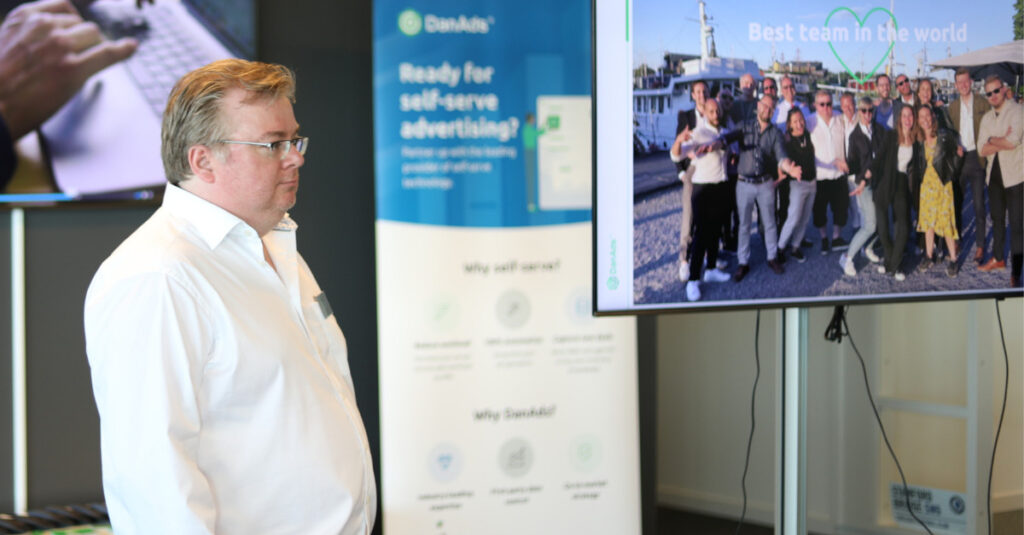Nb: this article was originally published by Fotis Georgiadis in Authority Magazine.
As part of our series about the “Five Things You Need To Be A Highly Effective Leader During Turbulent Times”, we had the pleasure of interviewing Istvan Beres. Istvan Beres is CEO of DanAds, which he co-founded in 2013 with Peo Persson. As the world’s leading provider of self-serve advertising platforms, DanAds is helping to pave the way for a more transparent advertising ecosystem.
Thank you so much for your time! I know that you are a very busy person. Our readers would love to “get to know you” a bit better. Can you tell us a bit about your ‘backstory’ and how you got started?
I moved from Transylvania to Sweden as a 14-year-old and founded my first company while still a teenager. From there, I helped turn a record store with two locations into a national chain with 25 locations at its peak among numerous other ventures, including stints at CDON and United Influencers. Today I am the CEO and co-founder of DanAds, the world’s leading provider of self-serve advertising platforms for the publishing industry.
Can you share a story about the funniest mistake you made when you were first starting? Can you tell us what lessons or ‘take aways’ you learned from that?
My first job was at a music store. The day I started, I showed up in a full suit and tie. Everyone at that time worked in worn, over washed free merch t-shirts. The lesson learned was that you should adapt your attire to the environment you’re working in. Everyone was looking at me like I was in a zoo.
None of us are able to achieve success without some help along the way. Is there a particular person who you are grateful towards who helped get you to where you are? Can you share a story?
I come from an entrepreneurial family, where my father was always a role model for me. But during the journey, there have been many people who have helped. My biggest “help” came when I was 18 and feeling a little crooked in life. One of my teachers wanted to challenge me in every lesson. It was almost like bullying, but he helped me realize that I can do anything and that I can do it better than everyone else. Without a doubt, this was the biggest influence in my life.
Extensive research suggests that “purpose driven businesses” are more successful in many areas. When your company started, what was its vision, what was its purpose?
The first company I joined (a chain of music stores) was, at the time, the biggest in Scandinavia and had a strong brand and position in the market. But they were broken by a technological change. Music, games, movies, and books began to be distributed digitally, primarily by illegal services such as Napster and Pirate Bay. These services forever changed the industry and people’s view of owning something versus having access to something. Availability became greater than ownership, quality, or even the law. When I started DanAds, we had the same goal. We wanted to change an industry that is extremely manual, sluggish, and old-fashioned. It is still the same goal to disrupt that governs all our decisions.
Thank you for all that. Let’s now turn to the main focus of our discussion. Can you share with our readers a story from your own experience about how you lead your team during uncertain or difficult times?
You have to trust your employees and let those closest to the customer and market make the decision. For example, during Covid-19 we let those who wanted to work from home or remotely do so. But at the same time, we let those who did not have the conditions to work from home due to children, small apartments, etc., work in an office with large areas where they could comply with the recommendations of the authorities and feel safe.
Did you ever consider giving up? Where did you get the motivation to continue through your challenges? What sustains your drive?
Never. I have had to start my life over three times. The first time was when I was born. I was born with a cesarean section, and the doctors sent me home with my parents and said that I would die within a couple of hours or days. Evidently, they were wrong! The second time was when we moved to a new country. I was 14 years old and had to leave all my friends and material things to start again in a new country where I did not know the language or culture. The third time was when I was 40 years old and filed for bankruptcy. I lost everything and had to start over.
I have always had two important “guiding stars”. First: however bad you have it or think you have it, you still have it better than 99% of the world’s population. I have a loving family, friends, and my health. Second: if it were easy, anyone could do it, and then you would not be needed.
What would you say is the most critical role of a leader during challenging times?
The most important thing is that you share your vision, challenges, and goals with your colleagues. If you do not get along with your colleagues, you will lose their trust and indirectly the opportunity to run your company.
When the future seems so uncertain, what is the best way to boost morale? What can a leader do to inspire, motivate and engage their team?
Do as you expect them to do. Be a good role model. First at work and last out. Make sure you are available. If they trust you and the company’s role they will trust themselves and feel that they are part of something bigger than themselves.
What is the best way to communicate difficult news to one’s team and customers?
Always see that the glass is half full and not half empty. In all situations there is something positive. Concentrate on that and not on the problem. Anyone can find problems. Finding solutions to the problems that exist is much more important. So, never present a problem — present a solution.
How can a leader make plans when the future is so unpredictable?
Always focus on what you can influence. What you cannot influence is not interesting. You simply have to adapt to it. For me, a concrete example right now is the situation in Ukraine. I employ a large number of software developers in Ukraine, and of course, the possibility of conflict with Russia is a big concern. We make contingency plans where possible to ensure the safety and wellbeing of our staff, but at the same time, it is largely out of our control. We do our best to be straightforward, honest and adapt as quickly as we can to changing circumstances.
Is there a “number one principle” that can help guide a company through the ups and downs of turbulent times?
Concentrate on what you can solve. The rest will be resolved in some way, and it is out of your control anyhow. No need to waste time on that.
Can you share 3 or 4 of the most common mistakes you have seen other businesses make during difficult times? What should one keep in mind to avoid that?
Some try to solve what they cannot influence. Others do not dare to make a decision. It’s never good to let others make your decisions, which happens if you wait too long and hope for a solution. Stop trying to make the 100% safe decision, there is usually no such thing.
Generating new business, increasing your profits, or at least maintaining your financial stability can be challenging during good times, even more so during turbulent times. Can you share some of the strategies you use to keep forging ahead and not lose growth traction during a difficult economy?
I try to think in new directions. Do not let old decisions, culture, or “that we have always done so” guide your decisions. Just because no one else has done it or others have tried it and failed does not mean it does not work. In difficult times, you have to look up and try something new while not losing focus on your old customers, which is usually a company’s most important source of income, but you usually forget about them.
Here is the primary question of our discussion. Based on your experience and success, what are the five most important things a business leader should do to lead effectively during uncertain and turbulent times? Please share a story or an example for each.
Always partner up with people who love what you hate. If you love what you do then you usually do a much better job.
Trust your employees. They always do a better job if they feel confident.
Delegate. Do not try to micromanage everything. You will not have time.
Give responsibility. By forcing people to make decisions, they develop and realize that they “can.” They will not always be right but it’s the only way to get them to develop.
Create a culture where it is OK to make mistakes, as long as you learn from your mistakes and do not do it again. In this way, people dare to challenge themselves and develop.
Can you please give us your favorite “Life Lesson Quote”? Can you share how that was relevant to you in your life?
Concentrate on what you can solve. The rest will be resolved in some way, and it is out of your control anyhow. Usually, you try to fix all the problems in the world but of course, you can’t. So, no need to spill time and energy on things that are out of your control. For me, this is very much my reality. For me, this was my reality in an industry where change was beyond my control. My everyday life was to solve the profitability of my companies, not to try to change an industry.





